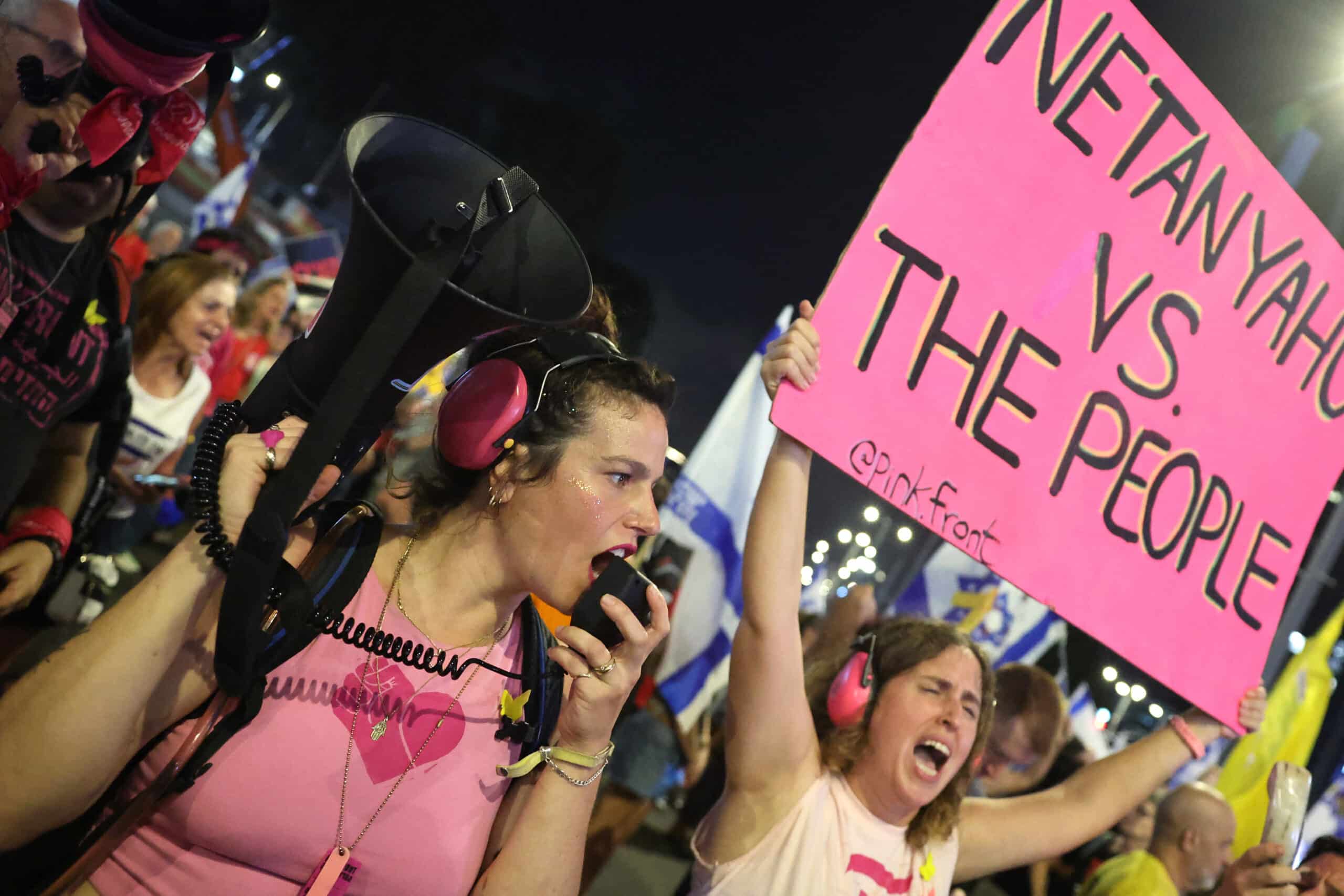
Kalanit Sharon, the 33-year-old artist and founder of the Pink Front civic movement, chants slogans during an anti-government protest in front of the Israel’s Defence Ministry in Tel Aviv on September 14, 2024, amid the ongoing war between Israel and the Palestinian militant Hamas group. Agence France-Presse
JERUSALEM — On October 7, Hamas militants stormed across the Gaza border to carry out the deadliest attack on Israel in its history, traumatizing the nation and sparking a devastating war.
Ahead of the attack’s first anniversary, AFP spoke to three Israelis to find out how their lives have been impacted.
Here are their stories:
The reservist colonel
Reservist Colonel Erez Regev headed to Gaza to fight in the first days of the war, leaving his farm, vegetable shop and restaurant in his wife Yael’s care.
“For the first four months we didn’t even go home,” the father-of-five said.
READ: Gaza war in its 12th month with truce hopes slim
His large date and mango plantations and his greenhouse in the northern region of the Golan, captured from Syria in 1967, need constant supervision.
These dozens of acres of agricultural land, an investment of “hundreds of thousands of shekels”, occupy his mind.
At the same time, Regev is “intensely busy with the military campaign and the fighting. Everything there is dramatic and fateful, with lives at stake.”
And when he does go home on leave, he says he “can’t sleep because my guys are fighting”.
READ: Some Israel visitors’ new stop on their tours: Hamas’ destruction
“You live in two worlds that are completely different. There are major significant things that affect you in both,” he said, adding that it was the same for other reservists in his unit, be they farmers, bankers or teachers.
“In the end, I just want to return to the tomato greenhouses, and take my child in the morning to pick mangoes,” he said.
Regev believes the war against Hamas is the only way to bring back the stability he needs.
“The war is already very long… but in the end we want security,” he said.
He wants to know “that I can plant tomatoes and that I’ll be here in two months to pick them”.
The music festival survivor
Nitsan Peeri was at the Nova music festival in southern Israel when Hamas gunmen attacked it in a brutal rampage.
“I haven’t fully processed it yet, and I’m still disconnected,” the 33-year-old said.
She and two friends sped away in their car when rockets fell on the festival grounds at 6:29 am on October 7, not realizing that Palestinian militants were also moving towards them.
At least 370 people were killed at the festival, official Israeli figures show.
It took Peeri 12 hours to get home that day, sometimes driving off-road to avoid danger.
She has since struggled with “loneliness, grief, loss and nightmares”.
She and her partner were engaged and living together, but after October 7, they broke up.
Peeri shuttered her hairdressing business for months, unable to bring herself to work.
She said she dealt with “episodes of crisis and feeling on edge… being irritable and sad” — mood swings that many trauma survivors experience.
Desperate to heal, Peeri tries to keep busy.
She goes surfing twice a week and hopes that eventually she will find peace and professional fulfilment, “and experience that entire package of life”.
The activist
“Nothing has changed. Things just became worse,” said the activist Kalanit Sharon of how she views Israeli politics.
“So it just became more important to do what we do,” added the 33-year-old artist and founder of the Pink Front, a collective of Israeli activists that has opposed Prime Minister Benjamin Netanyahu’s government since 2020.
In the impasse over the fate of scores of Israeli hostages that militants are still holding in Gaza, the activists see a symptom of Israeli government corruption.
Despite the pain, Sharon says that her collective aims to inspire hope.
The artists she works with have regularly attended large protests demanding that the government accept a ceasefire deal in exchange for the hostages’ release.
They wear pink outfits, wave pink flags and beat pink drums to stand out from the crowd and symbolize hopes for a brighter future.
In the immediate aftermath of October 7, her group helped provide food and shelter to some of those forced by the attack to flee their homes in southern Israel.
“People just came to us because it made them feel better,” she said.
Sharon said she has no plan to stop her activism.
“We think we have to do it until this government goes,” she said.